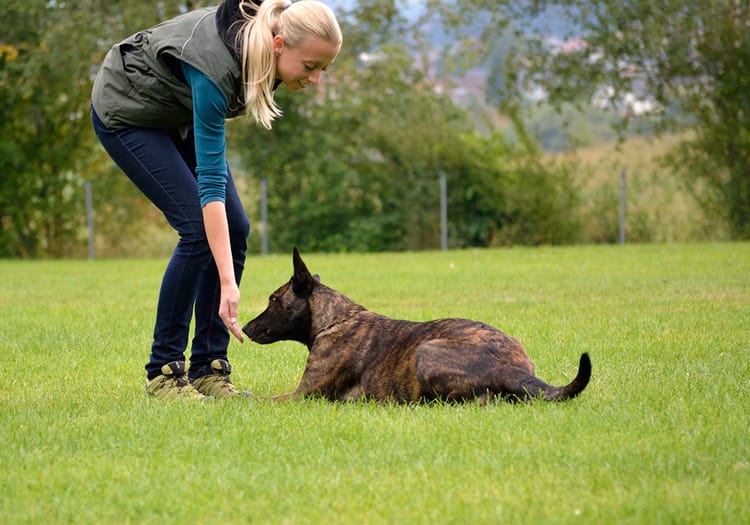Becoming a dog trainer


Have you thought about becoming a professional dog trainer? If you enjoy working with people to solve dog problems, going pro with pups may be your calling. Read on to learn which dog trainer program is right for you.
What’s involved?
Being a professional dog trainer means you do a lot of coaching. You need good listening and advising skills, and empathy. You need good writing skills. You also need good mechanical skills — animal training is a technology.
If you enjoy learning, love dogs, and like talking with people, dog training can be both fulfilling and fun.
How to learn
With the growing popularity of online learning, you have a variety of options. Finding dog trainer programs may be easy, but how do you choose which to complete?
A good dog trainer program or dog trainer course will cover the following:
- How to interpret a dog’s body language
- How dogs learn
- Learning theory and humane training techniques
- The basics of behavior modification
- How to improve your hands-on training skills
- How to teach training skills to clients
- How to offer the services your clients need
- How to write training plans
There are many online courses and dog trainer programs that include the above. A few I’m familiar with:
Animal Behavior Consulting: Principles & Practice (IAABC)
The Academy for Dog Trainers (Jean Donaldson)
Dog Trainer Professional (Karen Pryor Academy)
Professional Dog Trainer Course (CATCH Academy)
I teach two online courses for people who want to be dog trainers:
Beginning Behavior Consulting mentorship (IAABC)
Dog Training 101: What all dog trainers should know (APDT)
Besides studying dog trainer essentials, there are other necessary components to becoming well-rounded.
Become an intern
There aren’t many brick-and-mortar dog trainer programs in the United States, but you can learn from a local trainer. Many dog pros offer internships or apprentice opportunities. Ask a qualified dog behavior consultant near you if you can shadow them, or assist.
Some pro trainers offer their own dog trainer program, as paid mentorships. It’s worth asking other dog-knowledgeable folks in your network if they’re aware of such opportunities.
Being able to shadow an established trainer is useful. You can watch them interact with clients, design training plans and teach dogs new skills.
Read books and watch DVDs
Reading books and watching DVDs about dog training can be a great way to learn from experienced trainers at a low cost.
My top books for dog trainers include “The Culture Clash” by Jean Donaldson, “How Dogs Learn” by Mary Burch and Jon Bailey, and “Don’t Shoot the Dog!” by Karen Pryor.
Bob Bailey’s “The Fundamentals of Animal Training” and any of Sue Sternberg’s dog behavior presentations are worth adding to your video collection. Check out dogwise.com and tawzerdog.com for more titles and presenters.
Get hands-on experience
Walking dogs at your local shelter is one of the best hands-on experiences you can get. As a shelter volunteer, you have the opportunity to handle many dogs of different temperaments, breeds and sizes.
Many dog shelters have behavior and training programs already in place. You can improve your basic training skills by taking several dogs through the shelter’s basic obedience program.
Dog trainer programs to avoid
Visit your local dog training classes to observe before you ask to volunteer. Be sure the trainer is using science-based positive reinforcement training. Avoid trainers who train every dog using shock collars or other punishment techniques.
Also watch out for trainers who can’t explain or have no interest in learning theory.
Becoming certified
Besides providing clients assurance about your qualifications, certification signals you are a professional. Dog owners want you to have their interests at heart, and will ask questions. Talking about your certification is a great selling point.
There are no licensure or legal requirements to train dogs in the United States. In most cases, you must pass a test to become certified as a dog trainer. No single dog trainer program can prepare you for certification, a combination of knowledge and experience is required.
The International Association of Animal Behavior Consultants and the Certification Council of Pet Dog Trainers offer certifications. IAABC offers two levels of certification for dog behavior consultants. CCPDT offers a dog trainer certification, and a behavior consultant certification.
How to start your dog training business
Starting your own dog training business can feel intimidating, if you’ve never run a business or had to attract clients of your own. While not every dog trainer decides to go into business for him- or herself, many do. If venturing out on your own feels worrisome, here are a few resources that can help:
The Modern Dog Trainer offers an ongoing course on setting up as a new trainer, “Start Your Own Dog Training Business.” Certified dog trainer and marketing expert Ines McNeill takes you step-by-step through business planning and filings, to the steps to take to get clients, and provides all the forms you need to keep your business running smoothly. By signing up at this link, you’ll save $49 off the cost of the course, and I get a modest referral fee.
A longtime player in the field, Dog Biz Success, offers individual consulting and paid curriculum for those trainers who are just getting started.
Continuing education
Once you’re working as a dog trainer, you’ll need to continue your education. IAABC and APDT host annual conferences, featuring the latest on dog training and animal behavior.
Set aside part of your dog training earnings for continuing education. You can attend these or other science-based workshops and seminars. And of course, the online learning options for dog training pros continue to grow.
Still not sure?
If you’re still not sure whether you’re ready to become a professional dog trainer, check out “Common Obstacles to Starting a Dog Training Business,” by The Modern Dog Trainer.
Photo copyright: leungchopan / 123RF Stock Photo




